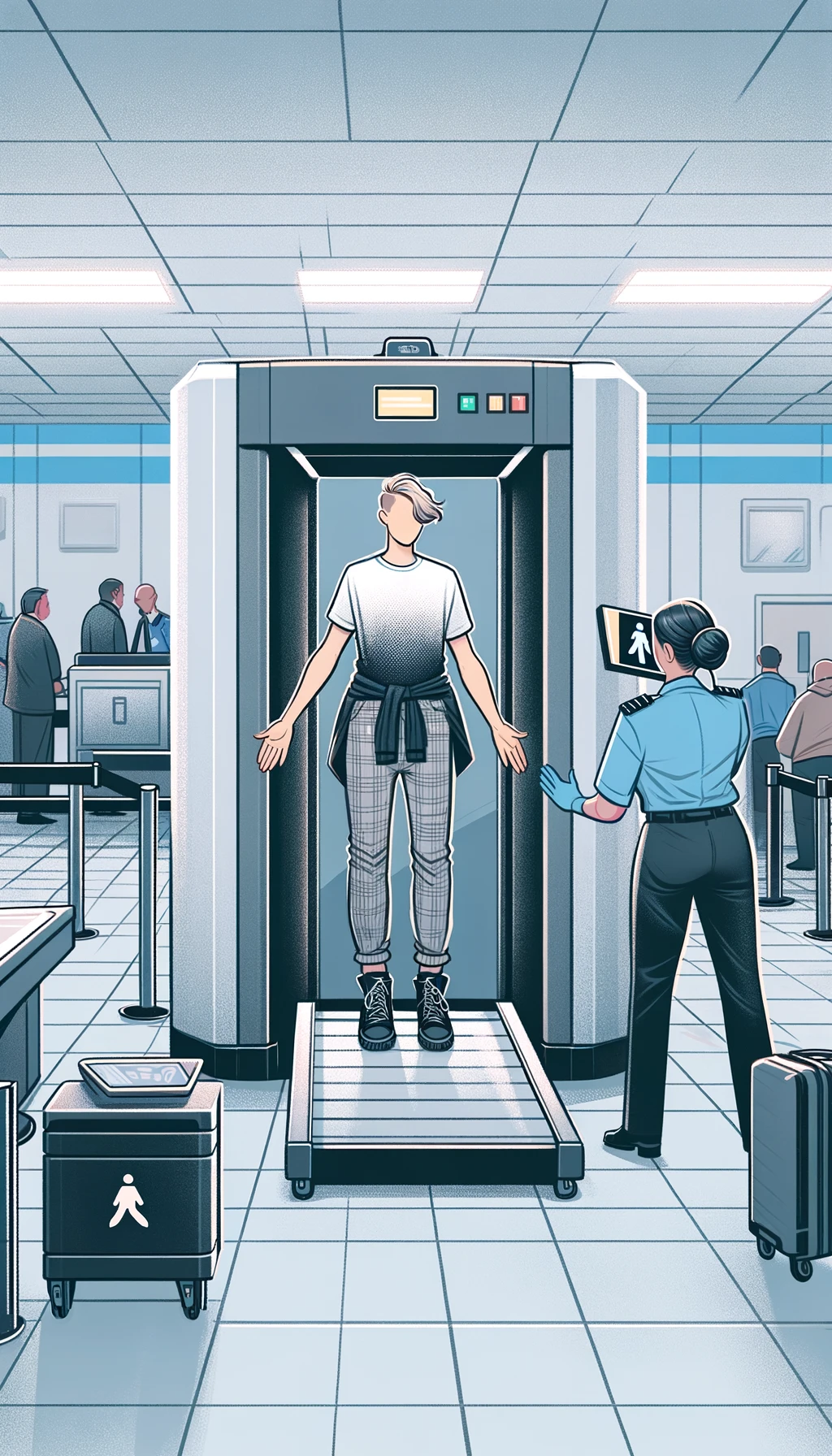
In the US, recent air travelers have become all-too-familiar with airport security protocol. Yet, few frequent fliers recognize the gendered assumptions underlying Transportation Security Administration (TSA) technology. From inside the black box of body scanners, algorithmic rules cause disproportionate scrutiny on transgender, gender non-conforming, and non-binary bodies, which can lead to traumatic incidents.
Advanced Imaging Technology (AIT) is TSA’s term for the technology it uses to scan the contours of a human body to identify areas that could conceal a potentially threatening item. Notably, AIT is used in the full-body scan machines. Stepping into the scanner, the traveler is prompted to stand like Da Vinci’s “Vitruvian Man”, feet placed shoulder width apart on the designated foot pads and arms raised slightly above the shoulders with elbows bent inward to form an incomplete delta just above the head. You may already know the drill.
These ubiquitous TSA scanners now feature so-called Automatic Target Recognition (ATR) software. ATR examines each body scan image and shows the TSA agent a generic outline of a human figure, highlighting the locations of any identified "anomalies" or "alarms" that warrant further scrutiny. TSA says that ATR software supports travelers’ privacy and dignity by preventing human agents from examining actual images of a traveler’s body.
As recently as 2022, upon stepping into the full-body scanner, the TSA agent presses a button “designating [the passenger’s] gender as male or female based on the TSA officer’s assessment of how you present.” This feature is considered necessary to the scanner’s ability to detect anomalous objects because, according to the TSA, the machine’s software inspects male and female bodies in a way that correlates with assumed anatomical differences.
Furthermore, images captured by full-body scanners routinely expose the size and existence of prosthetics, areas of concentrated body fat (like breasts and genitals), and devices associated with surgical interventions such as feeding tubes and colostomy bags. These features distinguish modern full-body scanners from traditional body-imaging technology. Thus, AIT joined a growing list of “advanced” systems that are, quite literally, designed to scrutinize deviations from binary gender assumptions and bodily norms.
Recent Legal Challenges
In 2019, Kimberly Erway, the mother of a transgender teenager, sued the TSA in the Eastern District of North Carolina.[1] Erway alleges that a TSA agent misgendered her 15-year-old daughter during a full-body scan, leading to a false positive reading that triggered an alert. In response to the alert, the teenager explained to the TSA agent that she was transgender and requested another scan. The agent refused to repeat the scan and, instead, told the minor and mother that she would need to perform a pat-down on the teenager in a private room. The lawsuit requests unspecified punitive and compensatory damages for a violation of the minor’s Fourth Amendment rights against unreasonable searches and intentional infliction of emotional distress. The case was transferred in August 2021 and remains pending in North Carolina court.
Under Biden, the TSA Inches Towards Inclusivity
Beginning in 2022, the TSA announced that it would be replacing AIT algorithms that rely on gender-based assumptions. According to a TSA press release, “[b]y replacing the current, gender-based system with this more accurate technology, TSA will improve the customer experience of transgender travelers who have previously been required to undergo additional screening due to alarms in sensitive areas.” However, given the obfuscated nature of surveillance technology, the government’s progress on implementing these changes remains largely unclear.
Resources for Travelers and Allies
Know Your Rights: From the National Center for Transgender Equality. Before your next flight, familiarize yourself with the standards of respect and privacy that passengers are legally entitled to, regardless of gender identity. Includes a guide to filing complaints online against TSA agents and airport or airline staff.
Name Change Project: The Transgender Legal Defense & Education Fund’s initiative provides TGNCNB (transgender, gender non-conforming, non-binary) community members with pro bono/free legal representation during the name change process. Many law schools, offer opportunities for law students to support local and nationwide initiatives.
[1] Erway v. U.S. Transp. Sec. Admin., Case No. 5:20-cv-00141-M (E.D.N.C. Oct. 29, 2020)
